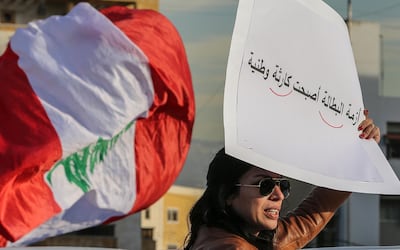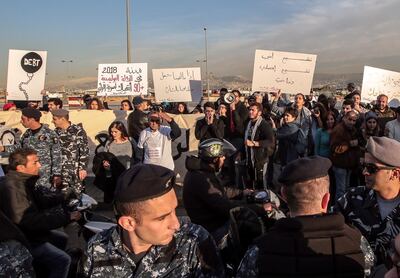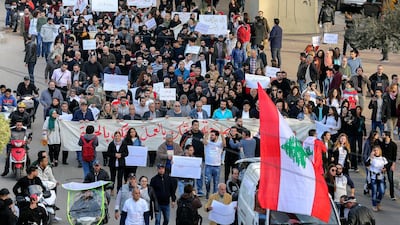Thousands of people rallied this weekend across Lebanon to demand improved health services, jobs, fairer taxation and an end to sectarianism.
In recent months, more strikes and demonstrations have taken place across the small eastern Mediterranean country as discontent grows against a distant ruling elite that has been unable to form a government in the eight months since the last elections – the much delayed first national vote since 2009.
While Saturday’s demonstration was organised by civil society in Beirut, several small left-leaning parties led protests on Sunday outside the capital in the country’s main cities. Lebanon’s main political parties did not take part.
No official figures have been released, but one of the organisers of a demonstration in the southern city of Sidon said that over 5,000 people had participated.

In Saturday’s demonstration in Beirut, civil society, which won one seat in Parliament in the last parliamentary elections, organised a march from the Labour Ministry in the city’s Haret Hreik area to the Health Ministry in Bir Hasan some 4 kilometres away in a bid to spotlight high unemployment and a dysfunctional health system. Roughly 500 people attended, according to Darin Dandachly, from Beirut Madinati, a citizen’s movement born out of the 2016 municipal elections.
Reliable statistics are difficult to come by in Lebanon but Mrs Dandachly says that one-third of the country’s youth is unemployed, according to her movement’s research. While the largely privatised healthcare system can be top-notch for the wealthy, many Lebanese simply cannot afford it. At least half the workforce is employed informally, which means they don’t have access to social security and often cannot afford private insurance. Hospitals are facing rising holes in their budgets as ministry funding for healthcare covered by social security is delayed or inadequate.
“Every now and then we hear of someone dying at a hospital door because of lack of treatment”, said Arabi al Andari, a member of the Lebanese communist party – which does not have any elected representative in Parliament - who participated in the demonstrations.
_____________
Read more:
Lebanese workers strike over political stalemate
Lebanon's private sector ends 2018 on a grim note
Lebanon on brink of economic ruin, finance minister warns
_____________
The small Mediterranean country is a deeply unequal society, which houses several Forbes-listed billionaires, including two ex-Prime Ministers, alongside a poverty-stricken local and refugee population. The top 2 per cent of taxpayers earn 17 per cent of total national income, according to a 2017 UNDP report.
Many demonstrators blamed sectarianism for the country’s problems. A confessional agreement means the president is always a Maronite Christian, the prime minister a Sunni Muslim, and the speaker of parliament a Shia Muslim. Power-sharing along religious lines also occurs at the head of important government institutions, which UN reports say has encouraging nepotism.
Although the Taif Accord that ended the country’s 15-year civil war in 1990 includes an article about ending political sectarianism, no progress has been made in the intervening years.

Protesters are gearing up for a larger demonstration on January 20 in Beirut and hope to pressure political parties to form a government and to seriously tackle their demands. “It won’t be easy for them this time to implement unfair measures like before, such as increasing indirect taxes like VAT but sparing bankers and big real estate owners. A lot of people have had enough”, says Mr Andari. Last year, as part of a bill to give the public sector a pay rise, the government rose VAT from 10 to 11 per cent. Lebanon has a debt-to-GDP ratio of 148 per cent, one of the highest in the world, and recorded a fiscal deficit of $4.9 billion last year.
However, Lebanon’s last mass protests in 2015 that started over a waste crisis failed to change the current political system or force a sustainable solution to the rubbish. But, Ossama Saad, an MP for the centre-left Pan-Arabist ‘Popular Nasserist Organization’ in Sidon who took part in the demonstration, said this time is different. “We have learnt from past mistakes. We have a vision now”, he said.


